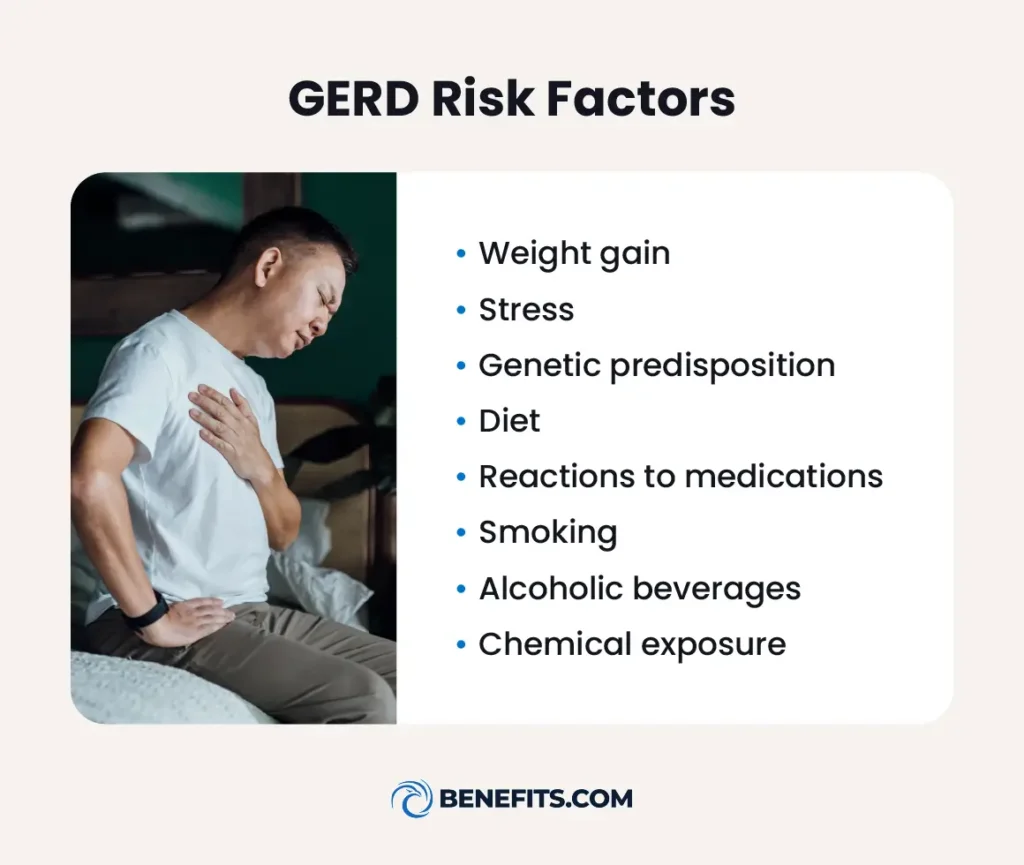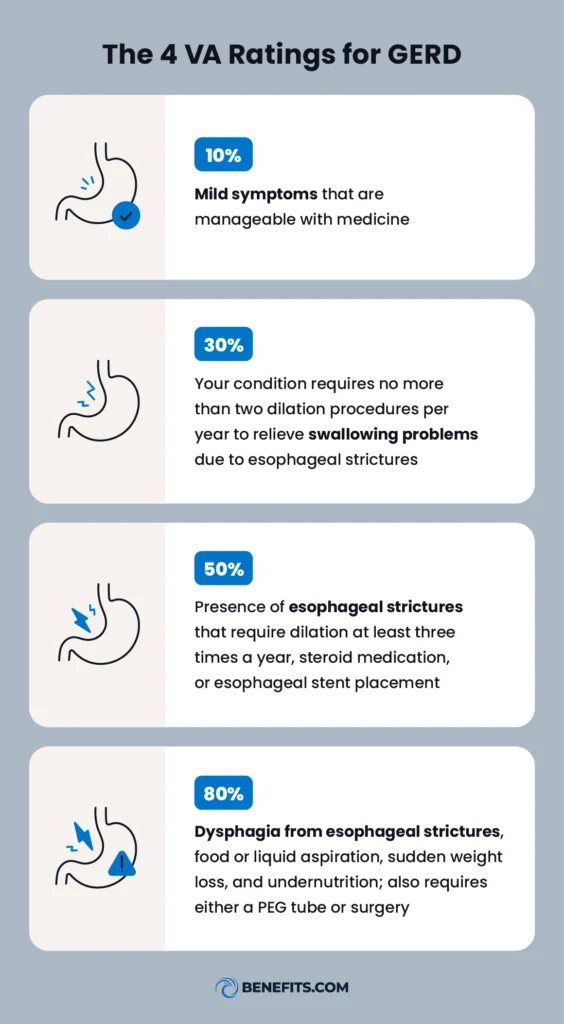Gastroesophageal reflux disease (GERD) is a chronic digestive disorder that affects around 20% of Americans. On May 19, 2024, the U.S. Department of Veterans
Affairs (VA) updated the GERD VA rating schedule to acknowledge four rating percentages: 10%, 30%, 50%, or 80%.
The VA provides disability benefits to veterans with conditions that were caused or made worse by their service in the military. This guide will break down each GERD VA rating category and help you navigate the disability application process.
Table of Contents
- What Is GERD and How Is It Related to Military Service?
- How Does the VA Rate GERD?
- What Are the Eligibility Requirements for VA Benefits?
- What Evidence Is Needed To Support Your Claim for VA Benefits?
- What Is the Process for Filing a Claim for GERD With the VA?
- How Can You Appeal a Rating Decision for GERD?
- Learn More About Your VA Disability Eligibility With Benefits.com
- FAQ
What Is GERD and How Is It Related to Military Service?
GERD is a more complex version of acid reflux — stomach contents rise back up into the esophagus in both cases, but GERD also comes with a host of other complications like heartburn, inflammation, and water brash.
Common GERD symptoms include:
- Epigastric distress
- Abdominal pain
- Chest pain
- Difficulty swallowing
- Sore throat
- Heartburn
- Excess mucus and saliva (water brash)
While many individuals experience acid reflux occasionally, GERD occurs more than twice a week for several weeks. Getting a GERD diagnosis is crucial if your symptoms become more frequent.
The Mayo Clinic lists several risk factors that can cause GERD, including:
- Pregnancy
- Obesity
- Smoking
- Alcohol
- Hiatal hernia
- Certain medications (e.g., pain relievers like aspirin)
- Certain foods and beverages
- Regularly eating large meals late at night
Traumatic brain injury, heart disease, sleep apnea, and mental health conditions like post-traumatic stress disorder (PTSD) are also linked to GERD.
Additional risk factors for service members can stem from military service, including high-stress activities, diet changes, and chemical exposure. Those with chronic GERD may also find their condition worsens during active duty.

How Does the VA Rate GERD?
The VA rating for GERD is now uniquely defined as of May 2024 under Diagnostic Code 7206 of the Federal Register. A person’s GERD VA disability rating can fall into one of four categories:
| Rating | Diagnostic Code 7206 |
| 10% | Your symptoms are manageable with medication and dietary changes. |
| 30% | Your condition requires no more than two dilation procedures per year to relieve swallowing problems due to esophageal strictures. |
| 50% | You have chronic esophageal strictures, receive three or more dilations per year, require steroidal medication, or receive an esophageal stent placement |
| 80% | You experience dysphagia, are aspirating food and liquids, have lost excessive weight, and have undergone surgery. |
Additionally, the PACT Act extends extra benefits to veterans with toxic exposures, like Agent Orange or fumes from burn pits.
What Conditions Are Linked to GERD?
Veterans can also have combined VA disability ratings if they have multiple medical conditions. They can integrate their GERD VA rating with other ratings, including the following:
- IBS VA rating
- PTSD VA rating
- Depression VA rating
- Sleep apnea VA rating
- Asthma VA rating
- Anxiety VA rating
What Are the Eligibility Requirements for VA Benefits?
To be eligible for VA disability benefits, veterans must meet specific criteria, including:
- Being a veteran or service member of the U.S. Armed Forces
- Having an official diagnosis from a licensed medical professional
- Proving the service connection of the disorder
Veterans who can prove that their GERD was caused or made worse by their time in the military may be eligible for a VA disability claim.

What Evidence Is Needed To Support Your Claim for VA Benefits?
Veterans must submit evidence that demonstrates the impact GERD has on their lives and how it connects to their military service. This evidence can include:
- Medical records: An official GERD diagnosis from your health care provider, medication prescriptions, and doctor’s notes can strengthen your claim.
- Test results: Compile endoscopy, blood work, and pH monitoring test results.
- Service documents: Service treatment records, military discharge documents, and buddy statements from fellow soldiers can help your case.
- VA claim exam: The VA may ask to conduct an additional physical exam and question you about your symptoms.
If the VA finds a service connection between your diagnosis and military service, you may be eligible for disability benefits. A nexus letter written by a medical professional can create a clear line between GERD and your service history.
A compensation and pension (C&P) exam can also bolster your claim for disability benefits. The VA may request an additional physical exam and question you about your symptoms to better understand your condition. This test may not always be necessary but it helps to know how it works in case you’re asked to take it.
What Is a C&P Exam?
A C&P exam assesses the severity of your GERD and its impact on your daily life. The VA uses this info in combination with other factors to help determine your disability rating.
C&P exams can be completed in as little as 15 minutes or take longer than an hour based on your condition and how much info the VA needs. If the VA requests a C&P exam for your GERD, schedule it as quickly as possible.
How Do You Prepare for the Exam?
Gather all relevant medical records, prescriptions, and treatment plans. Make a list of symptoms and how they affect your daily tasks. You’ll then meet with a health care provider who will ask questions, run tests, and review your medical records.
Be prepared to discuss your health honestly and in detail; minimizing or exaggerating symptoms doesn’t help. Discuss the frequency, duration, and intensity of your symptoms, and be as specific as possible — for example, “I have acid reflux three times a week” instead of “I often have acid reflux”.
What Happens After the Exam?
The VA will review the examiner’s findings alongside other evidence, like your medical records. You’ll get a letter detailing your benefits or the reasons for a denial. If your claim is denied, you have up to one year to request a Board Appeal decision and seek a different outcome.
What Is the Process for Filing a Claim for GERD With the VA?
Veterans must file a claim with their VA regional office, by mail, or online. The process generally goes as follows:
- Submit any relevant documents that support your GERD diagnosis.
- Complete VA Form 21-526EZ online, by mail, or in person.
- Attend any C&P exams scheduled by the VA.
- Await the VA’s decision; this process varies and can take 151 days or more.
The VA will review the claim and may contact you for more information or to schedule a VA claim exam. If the VA ultimately denies your claim, you can appeal the decision and contact a veterans disability attorney for guidance.
How Can You Appeal a Rating Decision for GERD?
Veterans who disagree with a rating decision can file an appeal with their local VA regional office in person, by mail, or by fax no later than one year after the VA issues the rating decision.
You can request a direct review, provide additional evidence, or petition a hearing. The VA will review the appeal and make a final determination on the case.
Common Mistakes Veterans Make When Filing a VA Claim
Many veterans do not provide enough evidence to support their claims. Not providing sufficient evidence can delay the process or even lead to the claim’s denial. Additionally, veterans should know the deadlines when filing a claim or appeal with the VA, as these can vary depending on individual cases.
Can You Receive Both Service-Connected Disability Compensation and VA Pension for GERD?
No, you can’t receive a VA pension and compensation for a service-connected disability. If you apply for both benefits and get approved, the VA will award whichever amount is greater.
The VA pension provides a monthly tax-free payment to veterans with limited income rated totally or permanently disabled due to a service-connected disability. The VA considers a person’s income, age, and the severity of their symptoms to calculate payments.
Learn More About Your VA Disability Eligibility With Benefits.com
Your GERD VA rating majorly influences the benefits you’re eligible for, but it’s not the only factor. It’s possible to earn a combined disability rating if your GERD symptoms overlap with other conditions.
Take our Benefits Quiz today to see which disability benefits you may qualify for.
FAQ
The VA’s updates to Diagnostic Code 7206 for GERD may lead to additional questions. Here are answers to some of the most common questions we’ve encountered.
What Test Can Confirm GERD?
An upper gastrointestinal endoscopy (EGD) is the most common way a gastroenterologist (GI) can detect GERD. In this procedure, GI doctors sedate their patients before inserting an endoscope down the esophagus to check for lesions, esophageal damage, and inflammation.
The actual procedure can take 10 to 20 minutes, though the patient may need a couple of hours to recover from sedation.
What Is the Difference Between a Temporary and Permanent Rating for GERD?
The VA assigns either a temporary or permanent rating to veterans with GERD. They may give a temporary rating if the veteran’s condition can improve over time and a permanent rating if their condition is likely to remain persistent. The VA may also assign a combined rating if a veteran has multiple disability ratings.
How Long Does It Typically Take To Receive a Rating Decision for GERD From the VA?
It can take an average of 151.2 days to receive a rating decision from the VA. The VA will contact the veteran directly when they have made a decision.
 Benefits.com Advisors
Benefits.com Advisors
With expertise spanning local, state, and federal benefit programs, our team is dedicated to guiding individuals towards the perfect program tailored to their unique circumstances.
Rise to the top with Peak Benefits!
Join our Peak Benefits Newsletter for the latest news, resources, and offers on all things government benefits.



















